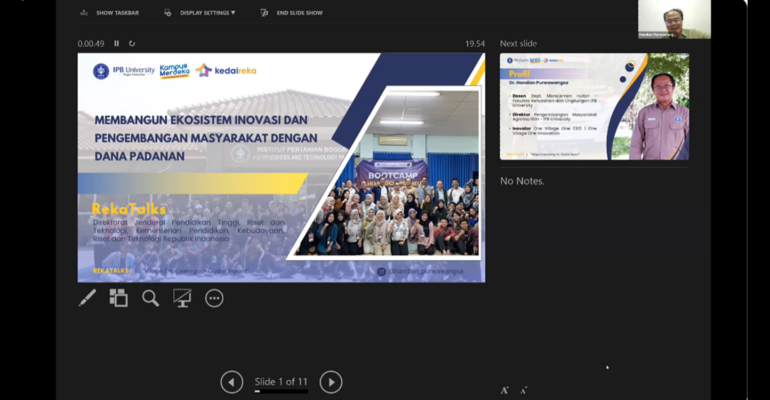Holding Sharing Session, Department of Forest Management IPB University Reviews Tips for Getting Kedaireka Grants

Department of Forest Management, Faculty of Forestry and Environment (Fahutan) IPB University held a Sharing Session. One of the things discussed was tips for success in getting a Kedaireka grant from the Director of Agromaritime Community Development at IPB University, Dr Handian Purwawangsa.
The Chairman of the Department of Forest Management IPB University, Dr Soni Trison, said that this Sharing Session program is a routine activity resulting from collaboration with the Innovation Center for Tropical Sciences (ICTS) and the Indonesian Forest Management Expert Community (Komhindo). This program aims to be a means of sharing knowledge and experience, as well as opening opportunities for collaboration between educational institutions, non-profit organizations (NGOs), ministries and institutions, and communities.
“It is hoped that this sharing session will bring great benefits to all and pave the way for better collaboration in the future. Hopefully, with a science, technology and community participation approach, a circular green economy ecosystem will be formed that is able to answer community problems,” said Dr Soni Trison.
Next, Dr Handian Purwawangsa delivered the main material in this Sharing Session. He started by sharing his team’s experiences and tips for success in getting the Kedaireka grant for two years in a row, working with large industrial partners such as Adaro and Astra Group.
He revealed that his team’s success in obtaining the Kedaireka grant was achieved by seriously reading the guidebook thoroughly before submitting the proposal. Dr Handian also shared tips on getting collaboration partners. The strategy is to focus on solving problems without making partners worry about audit activities. Conduct an audit by the program management team.
“It is important to build a team consisting of a substantial team, a technical team and an administrative team. Regarding readiness for pitching, read the guidebook, use language that is easy to understand, coordinate with partners, and evaluate proposals based on input from reviewers,” he explained.
Dr Handian also advised the importance of knowing the problem, solution and output that will be produced clearly. No less important, create a title that attracts attention.
He also encouraged the participants and wished them success in submitting proposals. Even though there are shortcomings and problems in implementation, this is considered a strategy to improve existing programs on campus, partners, or the government.
“Good intentions must be carried out in a good way to convince reviewers of the quality of the program,” he concluded.
On that occasion, ICTS was also briefly introduced. This institution was founded in 2020 and is committed to providing smart and creative solutions based on the use of tropical science and technology (science and technology). As a non-profit organization, ICTS bridges the dissemination of technology from laboratories to end users through partnerships with government, universities, research institutions, industry, and creative community groups. (*/Rz) (IAAS/HNJ)



